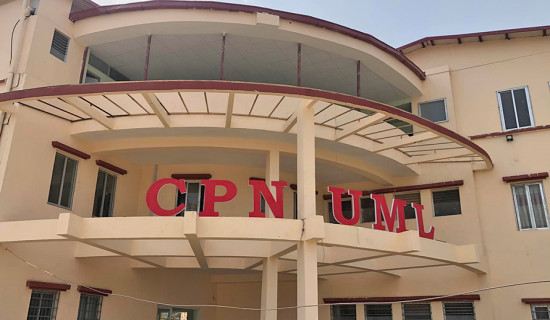- Tuesday, 14 October 2025
Swift Relief Distribution
The monsoon rain-induced floods and landslides have cast a pall over the approaching festivals. Unpredictable disaster has so far claimed at least 218 lives, with the destruction of public infrastructures and private properties worth hundreds of billions rupees. The loss of lives, homes and livelihoods have torn hundreds of families apart, sinking many villages into endless grief. The moments have become more agonising and acute as they were preparing for Dashain and Tihar, two biggest festivals of Nepalis. The government has swung into action to expedite the search, rescue and relief operations, and rehabilitation of the displaced people in the aftermath of the calamities that particularly hit the eastern and central regions of the country.
The government has decided to fly the national flag half-mast for three days to mourn the death of people. It has pledged Rs. 1 billion to the Prime Minister's Disaster Relief Fund. Additionally, Rs. 200,000 will be given to the families of those who lost their members in the disaster. If an individual is missing and their body is not found within ten days, they will be officially declared deceased, and their family will receive the same compensation as other victims. Similarly, the government is providing financial grants for temporary shelters to the affected people. The decision to offer Rs. 25,000 as an initial installment, followed by an additional Rs. 25,000, aims to give victims a sense of stability, however, temporary. Still, the real challenge lies in ensuring that these funds are distributed swiftly and efficiently. The district-level disaster management committee has been tasked with identifying beneficiaries and coordinating relief.
Delays in relief distribution will amount to rubbing salt into the wound of the victims. This is a reason why the government has set a target of disbursing the first installment within three days of identifying victims. But it requires coordination with the local bodies for effective distribution of the succor amount. The relief and rehabilitation works must not be lingered on the pretext of festival holidays. The government has also committed to restoring damaged infrastructure, particularly roads and bridges, and ensuring the availability of essential services like drinking water. The floods and landslips have damaged roads at various places and numerous bridges, disclosing the fragile state of infrastructure. Repairing this damage is crucial and also planning is most for future resilience. The ongoing effects of climate change mean that such disasters are likely to become more frequent. Long-term investments in infrastructure that can withstand such extreme disaster must be a priority.
The relief efforts are bolstered by the involvement of partner organisations, including United Nations agencies, and the Red Cross which will deploy volunteers for search, rescue, and rehabilitation efforts. This collaboration demonstrates the importance of a coordinated response, one that involves both government agencies and civil society. However, it also highlights the need for communities to come together during such difficult time. Individuals and communities can play their role in supporting those affected persons through donations, volunteering, or by raising awareness among them. There are many ways we can contribute to ease the burden on disaster-stricken families.
The government's relief plan, though comprehensive, is only the beginning. Long-term recovery requires continued efforts and investment, particularly in rebuilding homes and ensuring livelihood support. Health services must also remain a priority to prevent the outbreak of waterborne diseases and maintain public health in the disaster sites. The health camps and awareness programmes will be of big assistance for the affected people.

















